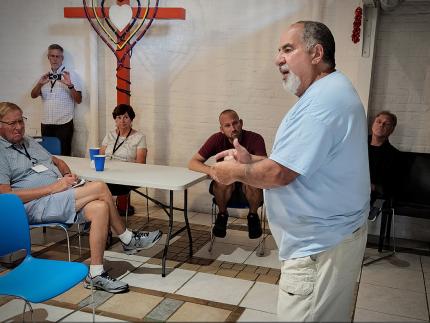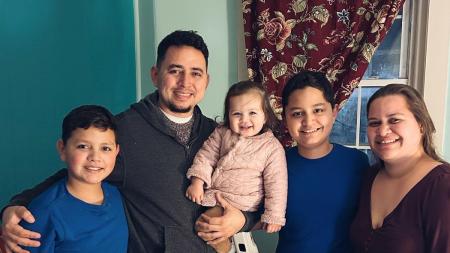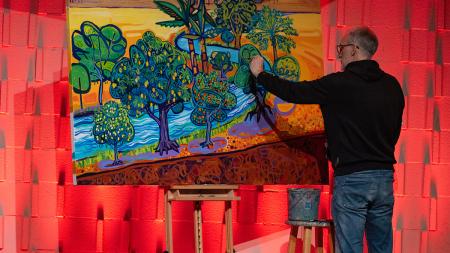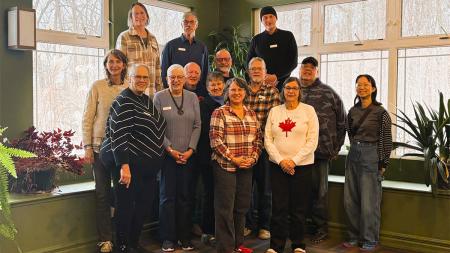‘The Gift of the City’

In bright sunshine outside the Tinley Park (Ill.) Convention Center we gathered in a circle to listen to Joel Van Dyke, urban ministry leader for Resonate Global Mission, describe the “Workshop on Wheels” at Inspire 2022.
Along with Jodi Koeman, church with community leader for World Renew, Van Dyke aimed to take us – 18 participants – on a day-long visit to well-established CRC ministry sites in inner-city Chicago.
Having written many stories for CRC News and three books featuring ministries in Chicago, I was there to write about and share information and reflections on the places we planned to visit. It would be a day of revelations and an uplifting look at parts of the city that can often be neglected.
“We’re going to have a chance to see on-the-ground urban ministry and visit grassroots CRC leaders in this beautiful city of Chicago,” said Van Dyke, who also currently serves as a pastor of Lee Street CRC in Wyoming, Mich.
Van Dyke noted that an important goal for the trip was to highlight the fact that the CRC, contrary to what some people might think, has deep roots in doing God’s work and learning about the Lord’s abundant grace in urban areas such as Chicago.
During the COVID-19 pandemic and out of a long-held passion for city ministry, Van Dyke had interviewed some 125 urban CRC ministry leaders and was able to detail the rich, in-depth legacy of urban ministry in the denomination.
“The CRC has been opening the gift of the city and learning about its hurts and its heart for many years,” said Van Dyke. “At the same time, there is much work to do, and we’ll see how some of that is being done.”
After Van Dyke prepared us for the day, reminding us to try to see these ministries through Jesus’ eyes, we piled into three vans and headed out for the “Workshop on Wheels.”
Roseland Christian Ministries
Nearly 30 years ago, I visited Roseland for a Sunday worship service and was able to interview Tony Van Zanten, an Iowa farmboy who had come here in 1976 and had stayed, steering the ministry through hard times and meanwhile helping to shape Roseland into a beacon of hope and healing for the people living in this rough and tumble, poverty-filled neighborhood that was once home to Dutch immigrants. Van Zanten is now retired.
When we spoke back then, Van Zanten told me, “I don’t think it is awkward for the Christian Reformed Church to be here. For twenty years, through various programs and with a great deal of help from the broader church, we’ve been able to offer people service, worship, and training – all in the name of God” (Flourishing in the Land [Eerdmans, 1996]).
Located in a large building that had once been the headquarters for the Back to God Hour radio ministry (now expanded and transformed into ReFrame Ministries), Roseland is going through a substantial renovation to its facility. We started our visit in the large room that now serves as the sanctuary. Elsewhere, we would see where the housing and other ministries are situated and where a new sanctuary will be located.
Steve Turner, a long-time member of Roseland, told us that nearly 30 years ago a friend was taking him to a rehabilitation facility outside Chicago. He wanted to get off heroin.
But along the way they drove by Roseland, and he saw several people milling around outside. Somehow he felt this was the place for him to be.
“Let me out,” he told the driver. “I will stay here.”
Soon, he joined Roseland’s Midnight Ministries rehab program. “It is for men like me battling addiction,” Turner said. “I graduated from the program and started working here.”
Van Zanten was instrumental in opening the door for Turner to serve at Roseland. He also helped Turner in many ways make the transition from being a homeless heroin addict to living clean-and-sober as a contributing member of the ministry.
“Working here has been about being a blessing to someone,” said Turner. “We let people know that Jesus loves them and wants them to live a stable, self-sufficient life. . . . Tony always wanted to empower people. He gave us a chance to serve.”
The ministry, Turner added, has become much more than a typical church or even the building now being remodeled. As the neighborhood has faced tough times, the ministry has developed programs – such as working to bring better housing to the area – to help people.
Turner finished his talk by breaking out in a loud, rousing version of the hymn “Jesus Loves Me.” With gusto he sang: “Jesus loves me! This I know, for the Bible tells me so. . . .”
Upstairs we visited a shelter for mothers and their children. As the kids ran around and played, one mother spoke of the value of having a safe place like this to stay.
On the workshop with us was Andy Littleton, a pastor of Mission Church in Tucson, Ariz. While he was studying at Calvin Theological Seminary, he said, he served as an intern at Roseland. As we left the upstairs shelter, he said: “I was here at the end of Tony’s time. I thank God for Tony and for Roseland and the movement of the Spirit in this place.”
Pullman Christian Reformed Church
Gathered in the large fellowship room of Pullman CRC, we learned from Pastor Gary Foster that we were standing in a former funeral home adapted for use as a church, which has now been worshiping here for many years.
“Pullman is a congregation born in the early 1970s out of troubled times,” he said. “That is when several CRC congregations in this area moved out into the suburbs. We remained behind in the midst of that [shuffle] and intentionally made the decision to be diverse.”
At one time the Pullman area had been considered a second downtown of Chicago, but many stores closed as the financial base of the community fell apart, leaving behind neighborhoods that churches such as Pullman have since sought to serve with youth programs, feeding centers, housing projects, and other ministries, Foster said.
Although many people in the surrounding area moved out over the years, some of them – or members of their families – have returned to take part in the work of the church.
During our visit, we also learned of new interest in some of the local neighborhoods, meaning that some sections are becoming homes for more affluent residents and that some long-time residents are having to move out.
“We were a community church, but we are now becoming a regional congregation,” said Foster.
A former pharmaceuticals salesman, Foster said he started attending Pullman with his wife several years ago and, over time, grew more deeply involved in the church, served on the council, and eventually stepped into the role as pastor – while taking classes to work on a degree in ministry.
He led us around the spacious sanctuary decorated with banners and art and then brought us into a basement room used for 12-step recovery meetings.
“Every Thanksgiving people in these meetings take over the church for a service and prayer and for a meal. They always invite members of the church. I’m honored that they are here,” said the pastor. “We have a long-standing relationship with them.”
From there, we ascended a narrow, winding staircase to the second floor, where the former funeral home director and his family once lived. The area is now used for youth ministry. Painted in bright colors, it has a rainbow of paintings on the wall.
Near the end of our visit, Van Dyke asked Foster what he would like to tell the CRC about Pullman and how this urban congregation, with its history of sharing the joy and strength of God for people living in a gritty urban environment, is a gift to the denomination.
“I’d say Christ has already won,” said Foster, “and we are called to put the gift on display – we love and care about the concerns of one another.”
Pullman is a church, he added, that stayed put when other congregations were fleeing difficulties in the city. Today, he said, it is a church that crosses cultural boundaries and “promotes God’s plan of every nation living under Christ’s care.”
Christ’s Vineyard CRC
At Christ’s Vineyard CRC in Humboldt Park, Juan Flores, the longtime pastor, explained how Manny Ortiz and his wife and others worked extensively in the 1980s to establish Spirit and Truth Fellowship in that area of Chicago, leading to the birth of Christ’s Vineyard as one of its branch ministries in 1987. The Ortizes later moved to north Philadelphia, where they began another wide-ranging ministry that is also called Spirit and Truth Fellowship. (For more about Spirit and Truth Fellowship, see the new book Joining Jesus: Ordinary People at the Edges of the Church.)
Flores focused especially on the role Ortiz played in helping him change his life after leaving a world of gang activity and heroin addiction.
“Manny put my eyes on Jesus right here in Chicago,” said Flores to our group after a hearty lunch of chicken, salad, and rice that the ministry had prepared for us. “He helped me to lovingly, carefully, and graciously see the neighborhood differently.”
Many years ago, he said, he led a gang called the Cobras and saw scores of friends killed in fights and conflicts with rival gangs. The city back then, during a time when he took heroin nearly every day, was a hostile place to him, he said. It was a place requiring an attitude of desperate survival. He certainly didn’t see it as any kind of precious gift, he said.
But once he and his wife, Debbie, opened the Christ’s Vineyard ministry nearly 35 years ago, they began carving out a haven for members of rival gangs. Flores had earned their respect, he said, by refusing to prosecute a gang member who had killed his son.
“We created a place of refuge for the gangs,” he said. “No matter what gang you belonged to, you could ring our bell, and we would answer.”
One night a gang member rang the bell. He had been shot and was bleeding profusely. Debbie held him in her arms until he died.
“At age 29,” said Flores, “I needed to learn how to lean on God – to satisfy God and not other people. I learned it is my job not to get upset over circumstances I have no control over. I learned that as a leader I need to be quiet and listen. Almost 40 years later, there is joy in realizing we are kingdom builders for God.”
As we drove from ministry to ministry, we saw many different neighborhoods. Some were gentrifying; some looked worn and beaten down; some had folks sitting on porches; and in one we saw a woman cutting hair.
Driving to our next stop in West Lawndale, we circled around on a freeway and saw the skyline of Chicago – tall buildings seeming to symbolize success and the reach and significance of big business. Overall, the skyline seemed to be an entirely different part of the city.
Lawndale CRC Lighthouse
Soon we pulled into the parking lot of Lawndale CRC Lighthouse and West Side Christian School. Having been there in 2016 to do research for Growing Pains: How Racial Struggles Changed a Church and School, I was surprised and pleased to see the asphalt covered with bright paintings. There was also a small stage for worship and other events standing in a corner of the lot.
Across the street, several garden beds were in bloom and full of vegetation. These had been installed since I’d been here to interview folks about the racial struggles of the late 1960s, in which Lawndale CRC parents were barred from enrolling their children in the nearby Cicero Christian School.
One of those people, Mary Post, principal of West Side Christian School, sat next to me as we listened to Juan Flores, who is now also a pastor at Lawndale while still serving at Christ’s Vineyard, share about the history of Lawndale. Flores and and copastor Eric Crawford and others discussed the conflict with the Cicero school and how West Side Christian School developed as a result.
Several Lawndale members also shared their experiences of being elementary school students back in the ’60s and how hard it was to be part of the racial struggle. Unable to go to the school in Cicero, some were bused to another Christian school over 20 miles away in Des Plaines, Ill.
Eventually, said Shelia Brook, a longtime member, the Lawndale parents decided to hire an attorney and, although they won their civil rights for education in court, the Cicero school board decided to close the school and move to the suburbs.
Not long afterward, the idea to open a school in West Lawndale was born, and West Side Christian School opened in 1970. Today Lawndale CRC Lighthouse meets inside the school.
“Here at Lawndale we see church as something that happens from Monday to Saturday – that is when our ministries take place. Sunday is our time of worship,” said Flores, whose church at Christ’s Vineyard joined hands a couple years ago with Lawndale.
Crawford added: “When people hurt, the church responds to the hurts.”
Widespread drug addiction, poverty, and violence are not uncommon in West Lawndale, and the church addresses these things in different ways. One way is to offer elementary education to all children from the area, regardless of their religion or lack of it. “Our church is willing to reach out,” said Crawford.”We see ourselves as a beacon of hope amidst a neighborhood where there are still many problems.”
As we got back into our vans and drove away, I looked out at the neighborhood as we passed through. Many homes were in rough shape; young people mingled on the streets; a large high school came into view. I could see that doing ministry down here had to be hard.
Yet I also thought of the West End Christian School – truly a lighthouse for the community, a place where young people can grow and thrive in an oasis of hope and care. I also thought of Roseland, Pullman, and Christ’s Vineyard – each growing deep roots and doing their work by viewing their ministries through the eyes of Jesus.


